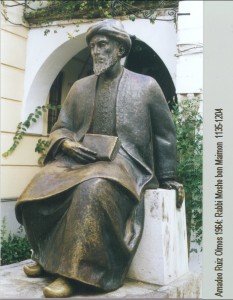
This view of Maimonides, the foremost medieval Jewish philosopher in the Islamic world, is offered by Yoav Phillips, who is offering a series of classes in the new beit midrash (study hall) sponsored jointly by Kehilat Yedidya and a group of graduates of the recently-closed Religious Kibbutz Movement yeshiva at Kibbutz Ein Tzurim.
The third chapter of Maimonides’ introduction relates, Phillips showed, how the Torah given to Moshe (Moses) on Mt. Sinai was transmitted to the Israelites in the desert and to Joshua, who then transmitted it to the elders and prophets, who then transmitted it to the rabbis.
As Westerners, Phillips pointed out, we accept our culture’s unstated assumption that the transmission of written texts is more reliable than that of oral texts. Jewish rabbinic tradition also differentiates between the written and the oral law; both were given to Moshe on Mt. Sinai, but the written law nevertheless has a higher status.
So it is surprising to see that in Maimonides’ account of the revelation, Moshe does not write the Torah down.





